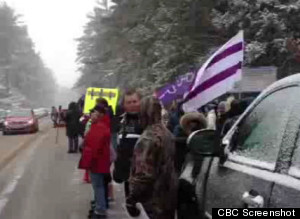 Protests for the national Idle No More movement continue today, as Mohawks from Quebec's Kanesatake community return to the infamous site of the 1990 Oka crisis.
Protests for the national Idle No More movement continue today, as Mohawks from Quebec's Kanesatake community return to the infamous site of the 1990 Oka crisis.The Idle No More movement's supporters oppose the Harper government's recently passed omnibus budget legislation, Bill C-45, and accuse the Tories of trampling on treaty rights.
First Nations communities have staged demonstrations across Canada, including on Parliament Hill. Yesterday more than 1,000 protesters marched through the streets of Ottawa after meeting with Theresa Spence, the chief of northern Ontario's troubled Attawapiskat First Nation. Spence is on the 12th day of a hunger strike.
The last time First Nations communities mobilized across Canada was during the 1990 Oka crisis in Quebec.
The conflict in the community west of Montreal was sparked by plans to expand a golf course in the neighbouring community of Oka on land the Mohawk claimed was a traditional burial ground. A provincial police officer, Cpl. Marcel Lemay, was killed in gunfire during the early days of the crisis, which lasted for 78 days.
Today members of Quebec's Kanesatake community gathered among the white pines in Kanesatake, the epicentre of the 1990 conflict.
The protesters began the day with a fire prayer service led by Grand Chief Serge Simon. About 80 members of the community attended the ceremony and placed tobacco on the fire, as a symbol of their solidarity with the Idle No More movement.
The protesters then marched a few hundred metres east on Highway 344 to the heart of the town of Oka, waving flags, banging drums and chanting. A line of cars slowly snaked behind the protesters. Some frustrated drivers turned off the road, while others honked in support.
Simon said today's protest aims to raise awareness about the Idle No More movement. He said he hopes the government will take notice soon.
Government's position won't change
Julie Vaux, a spokeswoman for Prime Minister Stephen Harper, said the rallies did not change the government's position. The Conservatives insist they are taking strong action to address aboriginal concerns.
As recently as Nov. 28, Harper and Aboriginal Affairs Minister John Duncan met with Assembly of First Nations Chief Shawn Atleo and others to review progress to date and discuss a range of issues, Vaux said.
"Our government hosted an historic gathering of the Crown and First Nations this past January," she also noted.
"Since then, the government has been working with First Nations leadership to make progress in several areas, most notably education and infrastructure on reserve."
However, many First Nations protesters involved in the Idle No More movement say there has been far too little progress.
Original Article
Source: huffington post
Author: cbc
No comments:
Post a Comment